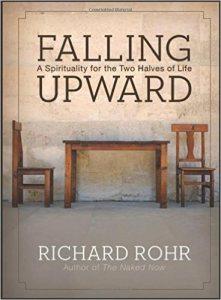 By Charles Kiker
By Charles Kiker
I have just completed reading Falling Upward by Richard Rohr. I had never read anything by Rohr before, but kept seeing references to his work, and decided to go into by non-existent book budget and order this one. (My book budget is determined by whatever I decide to purchase at the time—and the time was right for me to order this one.
And I’m glad I ordered this one. So here are some random reflections for whatever they’re worth to whatever reader happens upon them and happens to read them.
The emphasis in the book is on the two halves of life, not necessarily chronologically but more morally and spiritually. But somewhat chronologically because the author feels that it is rare that a young person (say under 40, more likely under 50) can enter into the second half of life as he uses the term.
In a nutshell, I think the author is saying that the first half of life is characterized by learning the rules, and learning how to live with them. The second half of life should be characterized by knowing the rules, but not being ruled by them. This is not antinomian libertarianism, but a disciplined life, using the rules or going beyond the rules for the betterment of the greater life under God. (Think about that phrase in the pledge of allegiance).
Of course we know it was added during the cold war to distance our godly capitalism from ungodly communism. But think “What if?” What if by the mid-fifties we could have had the national egostructure to truly live under God as a mature nation truly living for the betterment of all peoples?
But alas.
Knowing the rules and learning how to live with them can help build an ego structure for the first half of life. Second half of lifers build on and go beyond that ego structure. Rohr effectively uses the “parable of the loyal soldier.” (He never uses that term, but that is what it is. We could just call in an analogy.)
When Japanese soldiers returned from World War II their ego-identity was just “loyal soldier.” These returning loyal soldiers, Rohr says, “ . . . were not fit or prepared to civil or humane society”(p. 43). So some Japanese communities
created a communal ritual whereby a soldier was publicly thanked and praised effusively for his service to the people. After this was done at great length, an elder would stand and announce with authority something to this effect: “The war is now over. The community needs you to return as a man, a citizen, and something beyond a soldier. (p. 44)
Oh that we could do something like that with our returning soldiers!
We are taught to be loyal soldiers, in our civic affairs and in our spiritual affairs. The elder son in the parable of the prodigal was a loyal soldier. Rohr says the voice of the loyal soldier is a good guide for the first half of life. It teaches us to look both ways before crossing the street, and to have enough impulse control to avoid dangerous addictions and compulsive emotions. “We must learn these lessons to get off to a good start” (pp. 45 f.).
The first half of life prepares us to live in the kingdoms of this world. The second half of live prepares us for the kingdom of God. It’s no accident that people clamor for the Ten Commandments to be posted on the courthouse square, but not the Beatitudes. After all, the law is what courthouses are about.
From time to time, and intensively and extensively at the end of the book, Rohr waxes autobiographical. I found myself reflecting autobiographically as well.
Two years ago I published my own autobiography: Haunted by the Holy Ghost: Memoirs of a Reluctant Prophet. The word “haunted” was very deliberate, as was the word “reluctant.” I think I had a pretty good grounding for the first half of life, but have had to grope my way toward the second, sometimes goaded by higher impulses, sometimes dragged kicking and screaming toward a higher spiritual life.
I can’t recall knowing anyone who lived in the second half of life. My mother and my mother-in-law were pretty close. I recall one church member in Kansas City Kansas who was close but never would have said so. I recall an elderly couple in the church in Arco, Idaho who were close. I knew one ministerial colleague, thought by many to be a rank heretic, who was close; and he’s there now, may he rest in peace!
I think Rohr’s second half of life is close to the Wesleyan doctrine of sanctification. I knew a few people who claimed to be wholly sanctified. But they were just good first-half Pharisees. And the fact that I dare sit in judgment demonstrates that I am not there.
Maybe on a good day I have one foot in the door. But I’m pressing toward the mark of the high calling of God in Christ Jesus.
